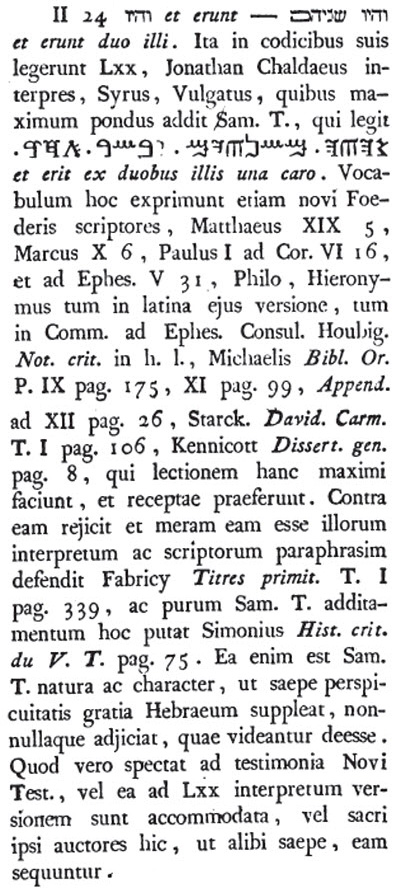ࠏࠋ ࠊࠍ ࠉࠏࠆࠁ ࠀࠉࠔ ࠀࠕ ࠀࠁࠉࠅ ࠅࠀࠕ ࠀࠌࠅ ࠅࠃࠁࠒ ࠁࠀࠔࠕࠅ ࠅࠄࠉࠄ ࠌࠔࠍࠉࠄࠌ ࠋࠁࠔࠓ ࠀࠇࠃ
Gen 2:24 [Samaritan Pentateuch]
על כן יעזב אישׁ את אביו ואת אמו ודבק באשׁתו והיה משׁניהם לבשׂר אחד׃
Gen 2:24 [Masoretic Text]
עַל־כֵּן֙ יַֽעֲזָב־אִ֔ישׁ אֶת־אָבִ֖יו וְאֶת־אִמֹּ֑ו וְדָבַ֣ק בְּאִשְׁתֹּ֔ו וְהָי֖וּ לְבָשָׂ֥ר אֶחָֽד׃
Gen 2:24 [Samaritan Targum]
בדיל כן ישבק גבר ית אבוה וית אמה ויתעלץ באתתה והוו משניהון לבסר חדה:
Therefore a man shall leave his father and his mother and cling to his wife, and they shall become one flesh.
| Number | Hebrew | Samaritan | Translation |
|---|---|---|---|
| 1 | על | ࠏࠋ | Therefore |
| 2 | כן | ࠊࠍ | Thus |
| 3 | יעזב | ࠉࠏࠆࠁ | Shall leave |
| 4 | איש | ࠀࠉࠔ | A man |
| 5 | את | ࠀࠕ | His |
| 6 | אביו | ࠀࠁࠉࠅ | Father |
| 7 | ואת | ࠅࠀࠕ | And his |
| 8 | אמו | ࠀࠌࠅ | Mother |
| 9 | ודבק | ࠅࠃࠁࠒ | And shall cling |
| 10 | באשתו | ࠁࠀࠔࠕࠅ | To his wife |
| 11 | והיה | ࠅࠄࠉࠄ | And they shall become |
| 12 | משניהם | ࠌࠔࠍࠉࠄࠌ | From the two of them |
| 13 | לבשר | ࠋࠁࠔࠓ | One flesh |
| 14 | אחד | ࠀࠇࠃ | One |
Morphology
- עַל־כֵּן֙ (ʿal-kēn) – Root: כן (k-n); Form: Preposition with adverb; Translation: “Therefore”; Notes: Indicates a conclusion drawn from the preceding narrative.
- יַֽעֲזָב (yaʿazov) – Root: עזב (ʿ-z-b); Form: Qal imperfect, third masculine singular; Translation: “he shall leave”; Notes: Future tense indicating a prescribed action.
- אִ֔ישׁ (ʾīš) – Root: איש (ʾ-y-š); Form: Noun, singular masculine; Translation: “man”; Notes: Refers to the male individual.
- אֶת־אָבִ֖יו (ʾet-ʾāviv) – Root: אב (ʾ-ʾ-b); Form: Particle with noun, singular masculine, third-person singular suffix; Translation: “his father”; Notes: The direct object marker introduces the person left.
- וְאֶת־אִמֹּ֑ו (wəʾet-ʾimmō) – Root: אם (ʾ-m); Form: Conjunction with particle and noun, singular feminine, third-person singular suffix; Translation: “and his mother”; Notes: Conjoins with the previous direct object.
- וְדָבַ֣ק (wəḏāvaq) – Root: דבק (d-b-q); Form: Qal perfect, third masculine singular; Translation: “and he shall cling”; Notes: Indicates a strong attachment.
- בְּאִשְׁתֹּ֔ו (bəʾištō) – Root: אשה (ʾ-š-h); Form: Preposition with noun, singular feminine, third-person singular suffix; Translation: “to his wife”; Notes: Indicates the object of clinging.
- וְהָי֖וּ (wəhāyū) – Root: היה (h-y-h); Form: Qal perfect, third masculine plural; Translation: “and they shall become”; Notes: Refers to the couple becoming unified.
- לְבָשָׂ֥ר (ləḇāśār) – Root: בשר (b-ś-r); Form: Preposition with noun, singular masculine; Translation: “one flesh”; Notes: Metaphor for unity and intimacy.
- אֶחָֽד (ʾeḥāḏ) – Root: אחד (ʾ-ḥ-d); Form: Adjective, singular masculine; Translation: “one”; Notes: Highlights the complete union.
